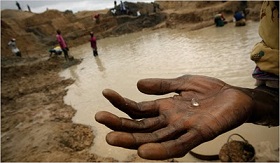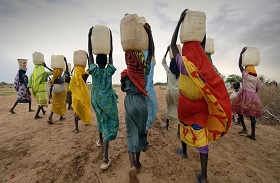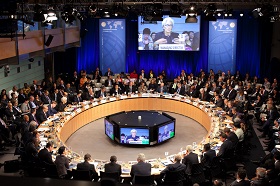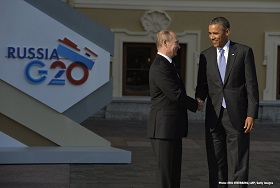Future of Global Governance
In
Login if you are already registered
(no votes) |
(0 votes) |
Doctor of Economics, Head of Department of IMEМО RAS, Professor of MGIMO University, RAS Corresponding Member, RIAC Member
Of the two possible scenarios for the evolution of global governance mechanisms, i.e. the weakening or strengthening the role of non-state actors, the second appears more likely. Under this scenario, support for the continued international expansion of Russian businesses, and the establishment of independent civil society organizations will enhance Russia's role in global governance.
Of the two possible scenarios for the evolution of global governance mechanisms, i.e. the weakening or strengthening the role of non-state actors, the second appears more likely. Under this scenario, support for the continued international expansion of Russian businesses, and the establishment of independent civil society organizations will enhance Russia's role in global governance.
Global Challenges: Who Is to Blame and What is to Be Done?
In recent years, forecasting global governance (GG) mechanisms has become a fashionable pastime for experts and intellectuals who seek to be public opinion leaders. This can be explained by two main factors. First, the collapse of the Westphalian system of international relations, with the attendant weakening of the UN and the inadequacy of supranational mechanisms for economic management during the global crisis, which thrust the need to reform the existing system of international organizations into the spotlight. Second, the rapid expansion of a range of economic and social factors, the effect of which is not controlled by governments of nation-states, but which has a powerful impact on the standard of living and values of people around the world, lent renewed impetus to the debate about the best answer to arising challenges.

The evolution of the World Economic Forum
from an elite club representing developed
economies into a platform for wide-ranging
discussions on the problems of global
development illustrates this phenomenon.
As is often the case when discussing issues of keen political significance, two distinct areas aspects of the GG debate took shape, focusing on the eternal questions: who is to blame? and what is to be done? Due to the longstanding popularity of the first question, the topic of global governance has been firmly associated in public opinion with “global conspiracy,” “global cabal,” “secret wire-pullers,” and “economic killers.” [1] Discussion of the second question, is, as a rule, is more restrained, although it often gives supporters of “conspiracy theory” more food for thought, especially in cases when the GG evolution forecast-makers and disseminators are affiliated with intelligence services (publications, prepared under the auspices of the U.S. National Intelligence Council, are typical examples (1, 2).
A clear view of the functions and actors in GG, shaped in the course of that particular area of discussion, is a natural starting point for assessing the prospects for its further development.
Global Governance as a Global Public Good
The specificity of analyzing GG functions in the international system lies in the fact that performing them provides global public goods (GPG). In economics, the term “public goods” is used to describe goods which comply with the following:
(1) Non-rivalry in consumption – consumption by one person does not diminish consumption by another;
(2) Non-excludability in provision – the producer cannot exclude any individual from consuming it, even if the latter fails to pay for the right to consume [2].
In turn, by the term global public good we understand a good that complies with these non-rivalry and non-excludability terms from the viewpoint of global political and economic system actors [3]. The following GPG categories have been identified:
- Final public goods that directly meet the needs of the global community (maintaining peace; stability of international trade and the financial system; preserving the environment, cultural heritage, etc.);
- Intermediate public goods (international regimes as sets of rules in the international arena), which contribute to the provision of final public goods.

The Kimberley Process, launched in 2000 on
the initiative of human rights NGOs and
De Beers, led to the adoption of a Certification
Scheme for Rough Diamonds at the ministerial
meeting in Interlaken (Switzerland)
in November 2002. Compliance with the
provisions of this document is now a must for
those involved in the diamond industry.
Thus, the functions of GG mechanisms deal with developing regulations governing the main areas of international interaction between state and non-state actors in world politics and economy (the creation of intermediate GPGs), as well as ensuring compliance with the relevant rules for attaining globally significant goals (creation of final GPGs). At present, we can distinguish three different types of GG mechanisms, depending on the actors involved in developing and implementing decisions [4].
Formal GG mechanisms relate to the activities of national governments concluding international agreements and taking decisions at the level of international intergovernmental organizations. Non-state actors representing the business sector and civil society can only participate indirectly in decision-making – by lobbying, sharing expertise and shaping public opinion.
Mixed GG mechanisms involve a partnership between state and non-state actors, with the latter representing the private sector and civil society. The first steps in this direction were made in the 1990s, when the World Bank launched a program of cooperation with non-governmental organizations (NGOs) on global development and to evaluate the impact of economic reforms, and the UN Development Program in cooperation with other UN organizations initiated a dialogue with transnational corporations (TNCs) to build a “global market with a human face.” [5]
Private GG mechanisms that do not involve the participation of national governments and international intergovernmental organizations traditionally come in for criticism from experts, primarily due to concerns that many globally important issues fall under the exclusive purview of TNCs or non-transparent club-type structures pursuing their own goals. So far, the achievements in creating such mechanisms are fairly modest, but their potential in developing proposals to be approved through official decision-making procedures should not be underestimated.
Evolution of Global Governance Mechanisms: Key Trends
The change in significance of these GG mechanisms and in the composition of participating actors will affect the most important trends, and the continuation, development, or termination of the latter will be of key importance for the future evolution of GG mechanisms.
The first trend is the fundamental strengthening of mixed GG mechanisms. This trend has three main manifestations.
First, since the mid-1990s, the involvement of non-state actors in the work of formal GG mechanisms has gained momentum, often making the latter take on the character of de facto mixed mechanisms [6].
Second, the role of international “negotiating platforms” for discussing the principles underlying global processes has significantly increased. The evolution of the World Economic Forum from an elite club representing developed economies into a platform for wide-ranging discussions on the problems of global development illustrates this phenomenon. Now, as in the past, it involves representatives of developed countries and transnational corporations, but now it also invites representatives of developing nations and civil society organizations.
Third, the process of developing a new generation of TNCs’ “code of conduct” has also gained ground. The most important initiatives in this area are the UN-backed Principles for Responsible Investment Initiativeconvened by the United Nations Environment Program Finance Initiative and UN Global Compact, and the International Standard ISO 26000:2010 Guidance on Social Responsibility, launched by the International Organization for Standardization, involving a large number of interested state and non-state actors. Although these documents were adopted at international intergovernmental organization level, the related mechanisms of governing global economic processes are mixed, since it is voluntary for TNCs to abide by these norms, and the decision to launch them into action is taken by transnational corporations themselves.
The second trend is the harmonization of the TNCs’ and NGOs’ positions. Contrary to popular belief about there being an inherent conflict of interests between TNCs and global civil society actors, they have succeeded in establishing tactical alliances on a number of global governance issues. In particular, during the 1990s, European TNCs and NGOs advocated the introduction of more stringent EU standards regarding the toxicity of car engines and the noise produced by aircraft engines. In the late 2000s, they formed a similar alliance to ban the use of incandescent light bulbs and limit greenhouse gas emissions. This kind of initiative, which in the early stages of implementation resemble private GG mechanisms, can later be transformed into mixed mechanisms. This was the case with the Kimberley Process – a joint government, industry, and civil society initiative to stem the international flow of conflict or blood diamonds [7]. Currently, environmental NGOs and companies developing “environmentally friendly” technologies play a decisive role in lobbying for a new agreement on preventing climate change, to replace the 1997 Kyoto Protocol.
The third trend is the search for a “new legitimacy” of formal GG mechanisms. The dramatic strengthening of the leading nations’ international positions in the emerging markets by the middle of the 2000s revealed the inadequacy of GG mechanisms in the economic sphere, since developed countries continued to play the dominant role. The global economic crisis that erupted in 2008 gave a fresh impetus to reforming international financial institutions (IMF and World Bank) with a view to increasing emerging powers’ representation. In addition, the crisis led to a shift in the focus of discussions on global economic regulation from the G8 to the G20 format. A discussion of the issues by the countries that produce about 90 percent of world GDP, which include, apart from the G8, groups of developed countries (South Korea, Australia, the EU as a regional association), major emerging powers (Russia, Argentina, China, India, Brazil), second-tier developing countries (Indonesia, Mexico, Turkey, South Africa) and the leading oil exporters (Russia, Saudi Arabia), makes it possible to reconcile a much broader range of interests. This step is designed to ensure the solutions offered are adequate to the nature of problems facing the global economy, and promote decisions’ legitimacy in the eyes of members of the international system.
Possible Scenarios and Russia's Interests

The global economic crisis that erupted in 2008 gave a fresh impetus to reforming international financial institutions (IMF and World Bank) with a view to increasing emerging powers’ representation.
Regardless of the diversity of GG mechanisms, the main point of interest in the future will be whether reflecting this strengthening of the non-state actors’ position in the world politics and economy, will maintain the momentum of its development in the 2000s. If it does, the world will see a further blurring of the leading role played by nation-states and their organizations in regulating global processes. If it does not, state actors in world politics and economics will be able to restore their weakened positions with the help of formats allowing broader coalitions, expanding the range of countries with privileged access to global decision-making.
Although to date neither of the first two scenarios manifests an evident superiority in terms of probability, the first looks a little more realistic. On the one hand, the global crisis has suspended the process of involving non-state actors in the work of formal GG mechanisms and the development of negotiating platforms. At the same time, mixed and private GG mechanisms demonstrate apparent progress in spheres of development such as expanding the regulatory role of TNCs’ “code of conduct” and forming alliances between TNCs and NGOs, especially on environmental issues. Thus, from April 2008 to April 2013, the number of investment institutions that became signatories to the Principles for Responsible Investment, grew more than threefold – from 362 to 1188.
On the other hand, this increased legitimacy of formal mechanisms is accompanied by a growing heterogeneity of member countries’ interests, undermining the prospects for coordinated decision-making. The conflict between legitimacy and a capacity to act is best displayed by the G8 and G20. The legitimacy deficit of the former and the capacity-to-act deficit of the latter significantly reduce available opportunities to find mutually acceptable solutions. It is significant that the most ambitious recent initiative – Action Plan on Base Erosion and Profit Shifting (BEPS), approved at the Moscow G20 Finance Ministers and Central Bank Governors’ Meeting on July 19-20, 2013, was “less legitimate” but is more homogeneous in terms of interests Organization for Economic Cooperation and Development, representing economically developed countries. Moreover, none of the major plans to further improve formal GG mechanisms today can ignore the role of non-state actors in providing global public goods (1, 2). Therefore, supplementing the G20 interstate format with parallel formats such as the Business 20, Civil 20 and the recently launched initiative Think Tank 20 [8] could be viewed as a step toward turning the existing GG mechanism into a mixed one.
On the face of it, a scenario providing the “new legitimation” of formal GG mechanisms while maintaining their leading role in international affairs would suit Russia, with its distinctive state dominance in politics and economy very well. However, through the appropriate mechanisms, Russia will inevitably have to deal with the growing influence of emerging powers, whose interests, in defiance of the euphoric forecasts from 2008-2009 of “joint struggle against the unipolar world,” do not necessarily coincide with its interests. Besides, the development of mixed and private GG mechanisms is a challenge, and not one that Russia is yet ready to accept. Effective protection of Russian interests in the relevant mechanisms requires the development of equal partnership interaction between state and non-state actors. This necessitates, above all, support for the international expansion of major Russian companies [9] and the formation of a sector of truly independent civil society organizations, initiated not by an order from the top but by citizens sharing common interests. At present, the fulfillment of these conditions requires the Russian political elite to make an unconventional decision. However, whether Russia successfully integrates into the emergent comprehensive GG system or continues to operate under restrictions – participating solely in discussions on internationally significant problems within formal GG mechanisms – depends on the choice made.
The enhanced role in existing and emerging GG mechanisms played by non-state actors in international politics and the global economy will, more than likely, turn the leading intergovernmental organizations into mixed ones in the coming decades. This will happen due to the growing number of initiatives involving the active participation of international business structures and global civil society not only in developing and discussing, but also in adopting and implementing, key international decisions. In the longer term, we can expect that, in a number of areas (relating, in particular, to the protection of the environment, and of workers’ and consumers’ rights) cooperation between TNCs and NGOs will result in the development of effective private regulatory regimes requiring minimal interference from government actors (with the latter remaining involved, above all, in passing judgment and enforcing court decisions). The emergence of new channels for ordinary citizens to influence developing global governance rules will be an important consequence of this development. This means that, at the beginning of the next century, experts will have good reason to talk about the legitimacy of the GG mechanisms, than rather waste time discussing “conspiracy theory” phantoms.
1. D. Estulin. The True Story of the Bilderberg Group. Walterville: TrineDay, 2009; John Perkins. Ispoved' jekonomicheskogo ubijtsy. Moscow.: Pretekst Publishers, 2008.
2. National defense is a classic example of a public good. Protecting the country’s citizens from aggression by a potential enemy does not weaken the safety of other citizens (non-rivalry), and at the same time, it is impossible “to exclude” those who have not contributed to creating it, for example, by tax evasion, from citizens protected by a national defense system (non-excludability).
3. Global Public Goods. International Cooperation in the 21st Century / Ed. by I. Kaul, I. Grunberg, M.A. Stern. N.Y.: Oxford University Press, 1999; Kaul I., Conceição P., Le Goulven K., Mendoza R.U. Providing Global Public Goods. Managing Globalization. N.Y.: Oxford University Press, 2003.
4. Nuscheler F. Global Governance, Development, and Peace // Global Trends and Global Governance / Ed. by P. Kennedy, D. Messner, F. Nuscheler. L.: Pluto Press, 2002. pp. 156–183; S.A. Afontsev. Politicheskie rynki i jekonomicheskaja politika. Moscow, Komkniga Publishers, 2010. pp. 263–301.
5. Forman Sh., Segaar D. New Coalitions for Global Governance: The Changing Dynamics of Multilateralism // Global Governance. 2006. V. 12. # 2, pp. 205–225; Schaeferdorff M., Campe S., Kaan Ch. Transnational Public-Private Partnerships in International Relations: Making Sense of Concepts, Research Frameworks, and Results // International Studies Review. 2009. V. 11. # 3, pp. 451–474.
6. Jönsson Ch. The John Holmes Memorial Lecture: International Organizations at the Moving Public-Private Borderline // Global Governance. 2013. V. 19. # 1, pp. 1–18. Analysis of the relevant processes in relation to the WTO, see I.S. Krylov. Jevoljutsija regulirovanija mirovoj jekonomiki: rol' smeshannyh mehanizmov // Bulletin of MGIMO-University, 2011. # 1, pp. 276-283.
7. The Kimberley Process, launched in 2000 on the initiative of human rights NGOs (Global Witness, Amnesty International) and De Beers, led to the adoption of a Certification Scheme for Rough Diamonds at the ministerial meeting in Interlaken (Switzerland) in November 2002. Compliance with the provisions of this document is now a must for those involved in the diamond industry.
8. Great Finance, Great Cooperation, Great Governance: Voices from 20 Nations. International Think Tank Conference. Beijing, August 21–22, 2013.
9. S. Afontsev, S. Lee. Rossijskij krupnyj biznes v uslovijah global'nogo krizisa // Voprosy jekonomiki. 2013. # 5, pp. 40–55
(no votes) |
(0 votes) |







